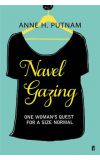
09 Jan 2013 13:11:57
Show me a woman who has never worried that she is too fat and I will show you a man. Or a woman who has been raised by extremely self-aware parents who didn't go on the F-plan diet in the 1980s. (Sorry, Mum!) Female fatness has been an issue since long before Susie Orbach wrote about it 35 years ago and it continues to be one in a world where over half of us (both men and women) will go on new-year diets. Now, of course, it's all about equality of self-loathing, and men are just as likely to develop anxieties around their body image as women. Which is why Anne Putnam's analysis here is both fascinating and flawed. There isn't even a nod to feminism or the pressures of cultural norms. In spite of that, though, her tale is inspiring. In that it makes you feel that if you only have a few post-Christmas pounds to lose, you are basically not doing too badly in life.
As quests go, this is a pretty unusual and, actually, tragic one. Putnam is no ordinary pudgy teenager turned neurotic twentysomething with a weight complex. She decided to undergo extreme-weight-loss surgery at the age of 17, when she weighed 20 stone.
Nine years later and 10 dress sizes smaller, she finds that changing your body doesn't automatically make you feel better about everything. In fact, she preferred life when she could blame everything on being massively fat. She still can't fit into all the clothes she wants to. She still struggles to think of herself as attractive. And life still treats her, as it can do all of us, unkindly. Worst of all, people still regard her as "large" even though, she argues bitterly, she is so much smaller than she was to begin with.
The book is a memoir about her feelings towards herself since childhood, working up towards surgery and what has happened afterwards. As a child, she is "the fat one" in a family where almost everyone else is athletic and, supposedly, issue-free around food. Her slim and pert mother can't bear for her to eat sugary foods, so Anne hides them and eats them in secret. Her father is a co-conspirator and they sneak doughnuts together on father-and-daughter dates. Anne is not keen to blame her parents for anything, so there is not much analysis about how psychologically (un)healthy this is.
Her tale of her life during and after surgery is heartbreaking. The decision was hers and her parents went along with it, with her father deciding to have the surgery himself, too. His life is less negatively impacted than Anne's. She finds herself having mood swings, enduring painful physical side effects and still craving all the "bad" foods that got her into this mess in the first place. There was so much I wanted to know that the book doesn't go into. How did it affect her relationship with her father? What did others around the family think about the fact that they underwent their surgery together?
There's a bit on this, when Putnam writes about how her father wasn't bothered by "excess skin", which is frequently a side effect of weight-loss surgery: "A little sagginess in the belly and throat wasn't such a big deal for an older man; it was expected, and his brain and bank balance would always be more closely tied to his self-esteem than his body ever would." But surely this is the whole point. It's the tie to self-esteem and image that never quite gets picked apart here.
This hints at the real elephant in this book. (Sorry.) Why is her self-esteem so closely tied to her weight? And why is her self-esteem still fairly damaged even when the bulk of the weight disappears? Putnam was only 26 when she wrote this book, and all these things may become clearer to her when she gets older. For now, I just wanted to give her a big hug and talk with her about something other than food and weight for five minutes. A brave, very readable memoir that digs deep – but not in quite the right places.

